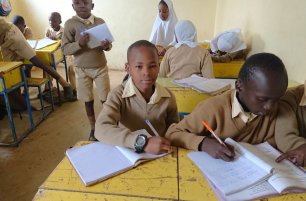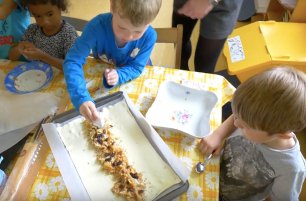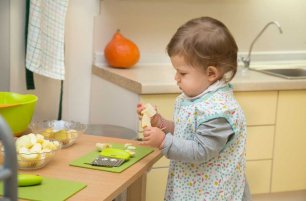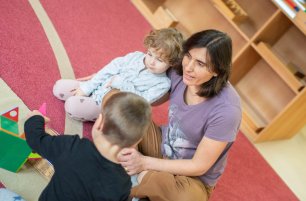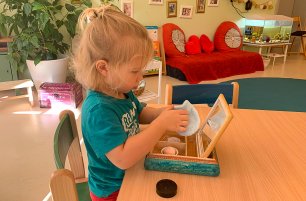Cooking With Children can be fun
It is often said that “the family that eats together, stays together”. We would like to suggest taking it a step further – and encourage every family to cook together, too. In Montessori, we know that kitchen work provides a host of benefits to children, all the way from toddlers to adolescents; it is a part of the Practical Life curriculum as soon as children can walk! However, its advantages are in no way tied to the classroom and can be just as easily – if not more so – applied at home.
Youngest toddlers can stir and toss salads, whisk batter, mash bananas, pour ingredients, peel eggs or fruits; preschoolers can peel and chop vegetables, knead and roll out dough, or grate cheese. School age children will follow recipes, handle ovens and stovetops with care, fry pancakes or bake muffins; and adolescents should plan meals, make shopping lists, take care of the groceries and set a table. Sure, with younger children, involving them might be more work than doing things ourselves, but think of it as a worthy investment. Not only in future mealtimes but also in your child’s wellbeing and development.

Cooking develops children’s bodies and brains.
Cooking is a useful, enjoyable and naturally motivated activity that gives a host of developmental benefits. It develops motor skills, gives a host of those ever-important sensory experiences, and stimulates the child’s sense of order and sequence; for older children, following (or writing down) a recipe is a great literacy exercise. Measuring ingredients or even multiplying a recipe gives a hands-on demonstration of mathematical concepts. Throughout the whole process, cooking promotes concentration and mindfulness; it is no accident that for many home cooks and bakers, it becomes a soothing, relaxing hobby.
Cooking helps children enjoy and be adventurous with food.
Do you have a picky eater at home? Involving them in food preparation is often incredibly effective as a means to encourage trying new flavours and branch out in their food preferences. A child who just spent half assembling a casserole or stirring a stew will have a whole lot more motivation to sample the fruit of their labours! Cooking is also a great opportunity to speak about healthy eating or the importance of a balanced diet with an older child.
Cooking is an essential life skill; mastering it naturally helps children feel confident, independent and capable.
We all get hungry and we all must eat; becoming able to fulfill this universal need without relying on others is a powerful experience for a child (sometimes for a young adult, too). Imagine the joy a five-year old would feel making pancakes for his parents, or how proud a ten-year old would be of making dinner for the whole family! These experiences will become an integral part of their personality.
Cooking is a wonderful natural opportunity for quality family time and bonding.
There’s proven research that some of the best bonding people experience is at times of shared, hands-on labour for a common goal. We hope you find an opportunity to enjoy it with your children soon!
Want to learn more? Read our next article:
